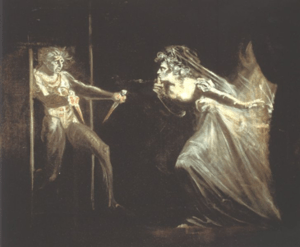Women Of Influence: What Macbeth Taught Us About Women In Power
That Scottish Shakespearian tragedy, so shrouded in mystery that it is unlucky even to say its name, gave society new ideas about women that have stayed with us since 1606, when the play debuted in London.
In the 15th century, the prominent philosophy focused on the “Chain of Being.” This was a view of the world which essentially saw a natural order, with god at the top, followed by angels, followed by the king, etc. Even plants and animals were part of the chain, and the philosophy extended into familial relationships too. The man was the head of his household, and his wife was his subordinate, like a microcosm of the larger chain. Macbeth is about a lot of things, but one of the themes is the subversion of the “Chain of Being.” Even if it seems to a modern reader like the story could end in a variety of ways, audiences in the early 15th century knew as soon as Macbeth killed the king that he would die in the end, because those who invite chaos into the “Chain of Being” will always be punished.
Another way that the “Chain of Being” is subverted in Macbeth is in the structure of the Macbeth household. It’s quickly established that Lady Macbeth is a strong and independent woman who runs her marriage. She coaxes her husband to commit murder, and is generally a cruel and “more masculine” character than any of Shakespeare’s other depictions of women. As soon as the audience in 1606 saw this, they likely realized that something was off, because a woman in control of a household represents a crack in the sacred “Chain of Being.” Lady Macbeth’s violation of the natural order is punished just like her husband’s, when her guilt pushes her to suicide.
From where I sit, reading Macbeth in my 10th grade English class, it’s upsetting to read a story where a strong woman is punished simply for being the dominant one in her relationship. Nonetheless, I can see Lady Macbeth’s strength as empowering. Despite her tragic end, she’s still a rare example of a powerful woman in a time when women were largely powerless.
Unfortunately, the same cannot be said of Macduff’s wife. Lady Macduff, who represents the right way” for a woman to behave, is docile and focused, and she only cares about her husband coming home from battle, and raising her children. These are noble concerns, of course, but Lady Macduff really has no character traits outside of her family, and while Macbeth and Lady Macbeth’s deaths have significance to the story and close their character arcs, Lady Macduff is murdered in what is essentially a power play meant to upset Macduff. Ultimately, she’s just used as a prop in a political standoff. And she’s the prototype of a proper woman. So in this world, being a woman who goes after power will be punished because women’s ambition goes against the “Chain of Being.” Alternatively, if you’re a “proper” woman, you might just be killed by an enemy who wants to upset your husband. What’s a girl to do?
Now, of course, Shakespeare’s plays are hundreds of years old, and many of the concepts he wrote about are now outdated. But it’s important to recognize that we’ve based many of our modern storytelling motifs and structures from Shakespeare’s works. Our movies and books are so often the offspring of Romeo and Juliet or Hamlet, and our literary symbolism and narrative formats were constructed by Shakespeare himself. When we analyze a classic work of literature, that has spawned countless interpretations, only to find that it has an underlying subplot which utterly denies women control over their life choices, it is disheartening.
In addition, we must recognize that Lady Macbeth is the reason we have the image of the plotting, deceitful, power-hungry woman in our pop culture. She is the original figure that spawned an entire archetype. And we know that fiction affects what we believe. When Hillary Clinton is painted as untrustworthy and un-presidential, for instance, is that because we are uncomfortable with a woman in power? After all, women are capable of a lot of nasty deeds, as Shakespeare taught us. Macbeth not only tells us that a woman in power is a corruption of the natural order, but also that when they are in power, they make mistakes and are cruel, untrustworthy leaders.
Still, I think that we must forgive Shakespeare, whose writing reflects the societal structure that was considered completely normal at his time. What’s important is to be aware of these structures that are still influencing what we believe today. In all of our fiction that comes out of dated works, we must be conscious of the biases and dangers presented by basing our modern stories on older sources. In the end, Shakespeare will never lose his status as a pivotal and important figure in the history of fiction, and Macbeth will probably always be read in high schools all over the world, and that’s okay. But we need to make sure that when we read Shakespeare, we’re recognizing the problems and injustices that we haven’t totally left behind, and considering how they continue to affect our lives.
This piece was written as part of JWA’s Rising Voices Fellowship.








This was great
Thanks 🙏
Interest